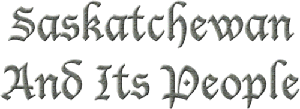PERSONAL KNOWLEDGE OF THE EARLY EUROPEAN IMMIGRANT.
DOUKHOBORS.
In the fall of 1898, or 1899, I was returning officer in the Territorial
election and I was returning officer for the district for which Wm. Eakins
was then returned. The district extended to the Swan River. In the
course of my work as Returning Officer I arrived at the old Fort Pelly.
I got there about midnight after a pretty tough trip through the Coté'
Reserve. I was on wheels, but there was six inches of wet snow on the
ground. Just as I drove into Pelly a wagon appeared, with wheels covered
with snow and frozen mud. There were five occupants of the vehicle.
After we had all been thawed out by Angus McBeth's hospitable Hudson's
Bay fire (and something else) I found that the travellers in the wagon
included Fred Fischer, a fine fellow, well known, who was assistant to
the Indian Agent at Coté' Reserve. He was acting as guide to some Douk-
hobor delegates, one of whom was a Russian Prince, a follower of Tolstoi.
The other two were ordinary Doukhobors, big solemn fellows, but capable
looking. It appears that the Russian Dowager Empress had interested
herself on their behalf, and the Russian Doukhobors were given leave to
emigrate. They had been harrassed for generations, as they preferred
martyrdom rather than accept military service, which was against their
religious principles, and even the Cossacks had got tired of persecuting
them without results. The Doukhobors had first selected the' island of
Cyprus in the Mediterranean as their objective, but finding it unsuitable,
they had decided to take a look at the Canadian West. Hence the delegates
in the wagon with Fred Fischer.
They were looking for running water, wood and good soil, and they
were not particular where it was as they intended to live within them-
selves. Suitable locations far from railways or projected railways (at
that time) were found at Swan River, east and west of the Assiniboine,
between the present Kamsack and Togo; Devil's Lake, south of the present
Buchanan on the Canadian Northern Railway; Stony Creek, Two Creeks,
and other points farther west, with which I was not familiar. The fol-
lowing spring large numbers of Doukhobors arrived at Yorkton. Mr.Creerar,
Immigration Agent at Yorkton, took charge. I only assisted for
a few weeks, but travelling on other work both winter and summer kept
me in touch with them. McGreavy was Commissioner of Immigration at
that time and took great interest in them, earning thereby the name of
"Doukhobor Bill."
Bibliography follows:

